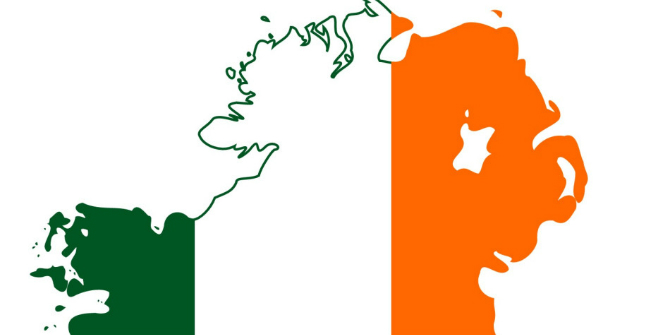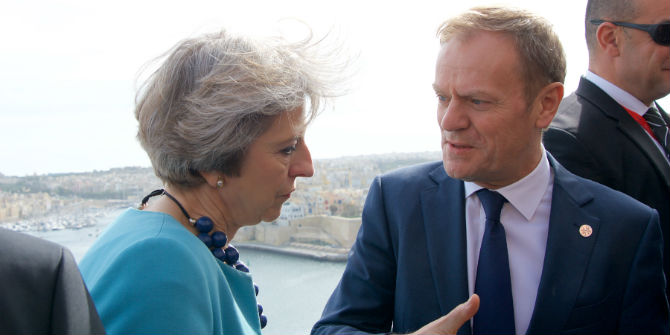 Addressing the Irish border question has been at the centre of Brexit. Proposed solutions to the issue have divided not just the UK and the EU, but also the UK government and Parliament, and the two main political parties in Northern Ireland. These polarised approaches have resulted in delays to the Brexit process. Given the current political impasse, a viable alternative solution to the Irish border conundrum is through constitutional means – i.e. Irish unification, writes Darryn Nyatanga (University of Liverpool). This involves altering the constitutional status of NI, which the Good Friday Agreement (GFA) 1998 allows for.
Addressing the Irish border question has been at the centre of Brexit. Proposed solutions to the issue have divided not just the UK and the EU, but also the UK government and Parliament, and the two main political parties in Northern Ireland. These polarised approaches have resulted in delays to the Brexit process. Given the current political impasse, a viable alternative solution to the Irish border conundrum is through constitutional means – i.e. Irish unification, writes Darryn Nyatanga (University of Liverpool). This involves altering the constitutional status of NI, which the Good Friday Agreement (GFA) 1998 allows for.
With the increasing likelihood of the emergence of a ‘hard border’ in Ireland post – Brexit, through the default legal position of a ‘no-deal’ Brexit, discussion of Irish unity is beginning to gain more traction. It is key to note that momentum in the debate does not entail that Irish unity is any closer: rather it illustrates the willingness to contemplate this option, which has been greatly overlooked in the Brexit withdrawal process.
The GFA and Irish unification
Embedded within the GFA 1998, are provisions that allow for NI’s constitutional status to alter. These provisions provide that NI will constitutionally remain part of the UK, until a majority of people vote in a border poll for a united Ireland, as set out in the GFA. The border poll refers to “the term for a referendum on Irish reunification… which would take place simultaneously in both the Republic of Ireland and Northern Ireland.” The border poll in NI would be initiated by the Secretary of State “if at any time it appears likely to him that a majority of those voting would express a wish that Northern Ireland should cease to be part of the United Kingdom and form part of a united Ireland.” If the majority vote for NI to be part of a sovereign Ireland, the Secretary of State “shall lay before Parliament such proposals to give effect to that wish as may be agreed between Her Majesty’s Government in the United Kingdom and the Government of Ireland.”
These constitutional arrangements have been translated into UK domestic law through the Northern Ireland Act 1998 and Articles 2 and 3 of the ROI’s constitution, as per requested by schedule 2 of the GFA.

United Ireland constitutional arrangements
Central to the debate over Irish Unification, is the question over what an all-Ireland future constitutional settlement would look like. The two different constitutions that currently govern the separate jurisdictions on the Island of Ireland are incompatible given their irreducible values e.g. consociationalism (a central part of the GFA 1998) is incompatible with the Irish constitutional order. There has been a number of proposed constitutional models for a united Ireland, which include;
- Unitary State under existing Irish Constitution – This can be understood as the German unification model, which would see NI absorbed into the Irish constitutional structure. The main issue with this model, however, is that it fails to incorporate consociationalism for the North.
- (Con) federal arrangement – This model would allow for the existing consociation arrangements in NI to remain, whilst also maintaining the status quo in the South. This model does provide for a weak Irish state nevertheless, with complications arising in the situation whereby power fails in the North, resulting in direct rule from the South – will NI have secession rights in such circumstances?
- Consociation in Unified unitary state – This model would require a new constitution with no separate Northern government. The main issue with this arrangement is in regards to the process of defining which communities to protect e.g. should the new minority Protestants / Unionists in a united Ireland be protected?
- Consociation through devolution – This model mirrors the current UK devolution arrangements, which would be transferred to Ireland. The difficulties with this, amongst other things, is the need for the renewal of the Sewel convention and this model would also transfer the West Lothian question to NI.
Irish unification as a solution to the Irish border question
With the ongoing impasse over the Brexit withdrawal negotiation process, the default legal position of a ‘no deal Brexit’ is becoming ever more real. The ramifications of such a scenario challenge the status quo of the seamless Irish border. Given then the threat of a ‘hard border’ in Ireland after Brexit, added with fact that NI voted majority to remain within the EU during the 2016 referendum, a compelling argument could be made for a border poll. This requires the Secretary of State to be inclined of the belief that a majority in NI would opt for a United Ireland, as a way of remaining within the EU.
Irish unity would both resolve the Irish border question, and also respect the 2016 Brexit referendum outcome in NI as it would keep the region within the EU. In regards to the former, having NI become part of a united Ireland would guarantee no divergence in regulations between North and South of the Island, ensuring the land border ceases to exist, moving it to the Irish sea instead. In regards to the latter, the assumption that NI, if it were to become part of a United Ireland, would get automatic EU membership was confirmed and formalised by the EU following negotiations with the Republic of Ireland in April 2017.
Challenges to Irish unification
Given the current political climate, however, it is very unlikely that the secretary of state who’s also part of the UK government would initiate a border poll anytime soon. The UK government has remained consistent in its aim to conserve the existing UK constitutional arrangements, during its Brexit withdrawal negotiations. Thereof the government has continued to reject any solution to the Irish border that separates NI from the rest of the UK by creating a border in the Irish sea. This approach of protecting the UK’s constitutional integrity is also central to ensuring that NI cannot be used as an influence to calls for Scottish independence. Thus the current UK government is very unlikely to support Irish unification as a solution to the Irish border question.
Another important hurdle to Irish Unification for NI, is the potential rejection (in a border poll) by the Republic of Ireland to incorporate the North into a united Ireland. A huge constitutional crisis would emerge, as the rejection by the South would void NI’s will to change its constitutional status. The GFA entails that the border polls would be done concurrently, this could be taken to mean at exactly the same time or similar period. In order to avoid a constitutional crisis like the one mentioned, it would be best to conduct the border polls in a similar period, with the South voting first and the North after.
Likelihood of a ‘yes’ vote in a border poll North and South
According to a recently published Irish Times/Ipsos MRBI poll, there was more support for a border poll in the South ( 49 per cent) than there was in the North ( 38 per cent ). If the border poll was held, a considerable majority in the South (62 per cent) said they would vote in favour of Irish unification. On the other hand, only 32 per cent of those in the North said they would vote for Irish unification in a border poll, whilst 45 per cent would vote against. In the North, the number in favour of Irish unity rises by 58 per cent from Catholic background voters, with 18 per cent against. Seventy-five per cent of voters from a Protestant background said they would vote against Irish unification in a border poll, with only 9% saying they would vote in favour.
As shown above, the South has a much greater appetite for Irish unification than the North, which is problematic given that the GFA requires a majority in favour for Irish unification from the two jurisdictions. However given the current impasse over the Brexit withdrawal process, the above figures in favour for Irish unification (in the North) can be predicted to increase, as argued below.
In the same poll, majority voters in NI stated that they reject a ‘hard Brexit’, would also vote to remain in the EU in a second referendum , and preferred customs checks in the Irish sea than on the Irish land border. Given this, one of the only certain ways to ensure these preferences is arguably through Irish unification.
This post represents the views of the author and not those of the Brexit blog, nor the LSE.
Darryn Nyatanga is a PhD researcher at the University of Liverpool.







I agree , but,since neither side wants a poll at this moment perhaps a hard border would sort things out. At least it would give the antis. a chance to show they can behave themselves. If not the UK can legitimately use as much force as it likes to control the dissidents. All the bleating from the EU and the World would possibly enable the UN to take control of the dissidents and a hard border.
Superb article but my god Ian Ogden your ignorance is astonishing like an imperialist from a different Century. The EU and US will be furious if the U.K. meddled in Ireland. The U.K. is looking short of friends in the world at the moment. The winds of change are coming and reunification will happen in the next 5-10 years.
I am from Vancouver,Canada and I wanted to say that Irish Reunification should have happened decades ago.The Republicans in Northern Ireland have put up an heroic fight going back to the 1960s for Reunification .That fight needs to continue until Reunification happens.The majority of people in the world supports the people in Northern Ireland fighting for their Reunification.One for All and All for Ireland’s 32.